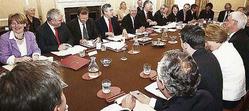
Britain's new Prime Minister Gordon Brown, (fourth from left), holds his first Cabinet meeting at London's 10 Downing Street, yesterday. Ministers attending the Cabinet meeting seen from top left, clockwise, Ruth Kelly, Des Browne, Sir Gus O'Donnell, (Cabinet Secretary), Prime Minister Gordon Brown, Jack Straw, Hilary Benn, John Hutton, Hazel Blears, James Purnell, John Denham, Baroness Scotland, Lord Bruce Grocott, Geoff Hoon, Harriet Harman, Alan Johnson, David Miliband, partly obscured, Alistair Darling, Jacqui Smith, Douglas Alexander, Peter Hain and Ed Balls. - AP LONDON (Reuters):
Prime Minister Gordon Brown named rising star David Miliband yesterday as Britain's youngest foreign minister in 30 years in a government shake-up designed to make a clean break from the Tony Blair years.
Brown, who is promising change to woo back voters after 10 years of Labour Party rule, and draw a line under the unpopular Iraq war, also named ally Alistair Darling as finance minister in a reshuffle that brought in many new faces.
As a minister in Blair's cabinet, Miliband, now 41, voted to support the U.S.-led invasion of Iraq in 2003, but was widely reported by British media to have been sceptical about the war.
Brown also gave a junior post to Mark Malloch Brown, a former U.N. deputy secretary general who has been critical of Britain and the United States over the Iraq war. He was named minister for Africa, Asia and the United Nations.
On Brown's first full day in office, there was a stark reminder of the Iraq war. Three British troops were killed by a roadside bomb, taking the number of British deaths in the Iraq war to 156. One was from Brown's own parliamentary constituency.
Analysts said the appointments of Miliband and Malloch Brown signalled Brown's wish for a subtle shift in approach on foreign policy after Blair's closeness to Washington that was unpopular among many Britons.
"That has been part of the agenda: to have a constructive, friendly relationship with the United States, but to be critical as far as necessary," said Wyn Grant, politics professor at Warwick University.<

